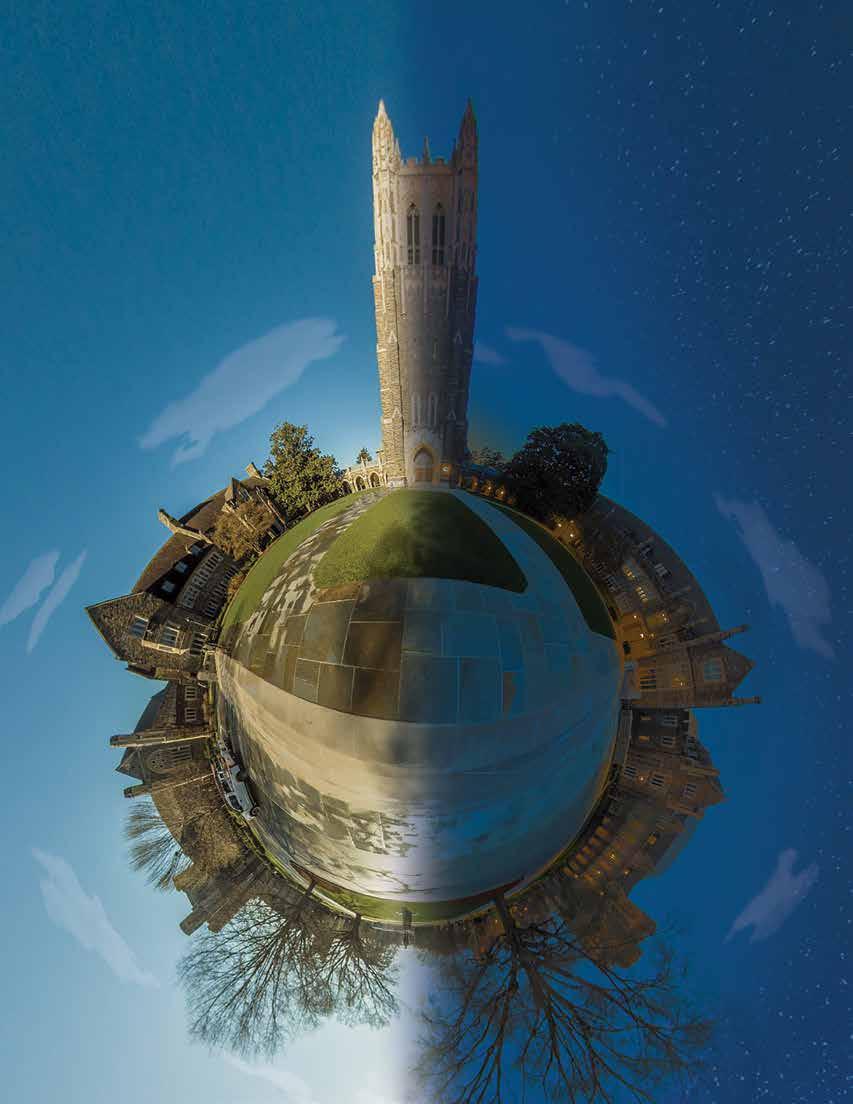
CAREER LESSONS THAT ENDURE 8 IN CRISIS OR CALM 10 HYBRID WORK THRIVES 11 NEWS YOU CAN USE • APRIL/MAY 2024 A 24-Hour Workday


Hybrid Work: Here to Stay
One of the most significant results of the COVID-19 pandemic has been the transformation of the long-established work location.
According to Gallup, 52% of individuals in roles that allow for remote work in the United States adhere to a hybrid schedule.
And that’s the situation at Duke, where work location flexibility for roles not directly involving patients or students continues to thrive.
On page 11, we delve into our latest survey that sheds light on remote work preferences among staff and faculty at Duke. Of nearly 3,500 respondents, 41% opt for a hybrid work arrangement of one to four days a week, while 27% are fully on-site.
Take Diamond Riley, who loves coming into the Duke Graduate School every day. One lure is the special coffee and creamer in the office. But it’s also about the community, conversations, and sense of belonging that comes with being in the office.
“It’s just catching up with people face to face, just noticing little things like my coworker saying, ‘Hey, I noticed that you got your hair cut yesterday,’” Riley, a staff assistant, told Senior Writer Jodie Valade. “I would say it’s little things – basically the social aspect of it.”
Among the employees who responded to our survey, 32% work entirely remotely, a slight decrease from last year.

Brian Ridder is among the colleagues who works from home. A Staff Specialist for Procurement and Supply Chain Management, he says spending more time at home allows him the opportunity to foster beagles. Since 2020, he has fostered 10 beagles. “I am able to help them transition to being in a home for those first couple days and weeks,” Ridder told Valade. “They share my office space and don’t always find the Zooms entertaining.”
As we navigate the evolving landscape of work arrangements, let’s not forget the importance of connection and the little routines that bring joy to our days – whether it's enjoying that first cup of morning coffee in the office or taking a leisurely stroll across Abele Quad on a sunny day.
Follow how colleagues build a positive culture at Duke with our “Forward Together” series – and share your stories: today.duke.edu/series/forward-together


4 A 24-Hour Workday

Duke’s 45,502 staff and faculty support priorities related to education, research and patient care, but their workdays are wildly different. Employees at Duke – North Carolina’s second-largest private employer – do a vast array of jobs across the state, nation and world. Discover how colleagues share their talents around the clock, playing pivotal roles in Duke’s larger story from different locations.
8 Career Lessons that Endure
Duke’s professional development programs provide experiences with lasting value. See how several colleagues have used Learning & Organization Development (L&OD) programs to grow their careers.
10 In Crisis or Calm
The Personal Assistance Service (PAS) at Duke provides up to eight confidential, short-term counseling sessions per concern at no-cost for staff, faculty and eligible family members. In the 2022-23 fiscal year, PAS provided 6,122 total counseling sessions, mostly for mental/emotional concerns and family, relationship, or child issues. 11


Paul Figuerado Design & Layout (919) 684-2107 paul.figuerado@duke.edu
Stephen Schramm Senior Writer (919) 684-4639
stephen.schramm@duke.edu
Jodie Valade Senior Writer (919) 681-9965
jodie.valade@duke.edu
Travis Stanley Multimedia Producer (919) 684-4262
larry.stanley@duke.edu
2 WORKING@DUKE FROM
MINAI WORKING@DUKE CONTENTS 4 10 8 2017, 2014 Gold, 2019, 2015, 2013, Silver, 2016, 2009, 2007 Bronze, Print Internal Audience Publications and 2012, 2011, 2009, 2008, 2007 Gold Medal, Internal Periodical Staff Writing
THE EDITOR LEANORA
Cover: Pictured are Duke University Chapel and Abele Quad in March 2024. Two images were captured in a 360-degree format and combined to create the image. By Travis Stanley and Paul Figuerado.
A Blend of On-site and Remote Work Thrives
How to Learn a New Language
Centennial Celebration: A Steady ‘Heartbeat’ of Duke Human Resources
Working Toward Racial Justice: Beyond the Chapel Walls Working@Duke is published quarterly by Duke’s Office of Communication Services. We invite your feedback and story ideas. Send email to working@duke.edu or call (919) 681-4533. Visit Working@Duke daily on Duke Today: working.duke.edu Contact us Leanora Minai Executive Director of Communications/Editor (919) 681-4533 leanora.minai@duke.edu
12
13
14
Paul S. Grantham Assistant Vice President (919) 681-4534 paul.grantham@duke.edu
Two beagles Brian Ridder adopted sit behind two he fostered. Photo: Brian Ridder.
BRIEFLY
Duke Farmers Market season opens April 25
Over the years, whenever Nakisha Harris visits the Duke Farmers Market on her lunch break, she’ll return to her clinic at Duke South and hear her coworkers gush over the fresh fruits and vegetables she’s gathered.

Harris loads up on the fresh cucumbers and cherries when she can find them, but she’ll snag anything else that looks tasty and in season, too. And her weekly habit has become contagious.
“My co-workers started going, the nurses down the hall – everybody,” said Harris, a phlebotomist for the Kidney Transplant Clinic in the Kidney/ Pancreas Transplant Clinic. “I just started coming in with my bag and showing everybody what I got, and they just started going, too.”
The 22nd season of the Duke Farmers Market opens on April 25 and continues from 11 a.m.-2 p.m. every Thursday until Oct. 10 on the Duke Medicine Pavilion Greenway.
As in years past, about 12 to 14 vendors are expected each week, selling fresh fruits and vegetables and prepared foods. Some of the confirmed vendors this year include Gabor Farms, Lyon Farms, Dojo Fresh and Ouda’s Food, while food trucks will include Bulkogi, Poblanos Tacos and Fiori Trattoria, among others.
“Our main goal is really to bring farm-fresh whole foods, produce and local goods and have it convenient for employees to be there,” said Brian Zelanko, Health Promotion Manager for LIVE FOR LIFE, Duke’s employee wellness program.
Share your Duke Farmers Market photos on social media with #HealthyDuke or submit here: hr.duke.edu/sendnews
Learn more about the market at hr.duke.edu/farmersmarket
Comedian and actor Jerry Seinfeld to deliver commencement address May 12
Comedian and actor Jerry Seinfeld will speak at Duke University’s commencement ceremony on May 12.
Now in his fifth decade as a stand-up comedian, Seinfeld is best known for playing a fictionalized version of himself in the NBC sitcom Seinfeld. The show aired for nine seasons between 1989 and 1998 and was the most-watched show in America at points during its run. It is cited as one of the best and most influential television comedy series ever made and earned Seinfeld an Emmy and Golden Globe award.

Seinfeld’s career has also included stand-up specials, documentaries and a popular interview series, Comedians in Cars Getting Coffee, which featured Seinfeld interviewing fellow comedians and other public figures while driving to get coffee.
“I am delighted that Jerry Seinfeld will be our 2024 commencement speaker,” said Duke University President Vincent E. Price. “Jerry is a pioneering entertainer and producer and a gifted observer of human nature who has an extraordinary ability to bring people together through humor. I look forward to the insights and wisdom he will share during our celebration of the Class of 2024.”
Seinfeld and his wife, Jessica, are the parents of a Duke alumna and a current Duke student and serve as national chairs of Duke’s Parents Committee. In 2001, Jerry and Jessica Seinfeld founded the Good+Foundation, a charitable organization focused on addressing family poverty.
Watch the livestream of the commencement ceremony at commencement.duke.edu
Duke awards 32 new distinguished professorships for 2024
Duke University has awarded distinguished professorships to 32 faculty and will recognize them in a ceremony at the Washington Duke Inn on May 23.
Distinguished professorships honor faculty who are wellestablished members of the Duke academic community and have also achieved distinction as creative scholars in their field or in their ability to transcend disciplines.

“I congratulate my colleagues on receiving distinguished professorships recognizing their impressive scholarly achievements and leadership in our academic community and beyond,” said Provost Alec D. Gallimore. “Duke is tremendously fortunate to count these bold thinkers among its faculty.”
During its February meeting, Duke’s Board of Trustees approved the awarding of Distinguished Professorships to the faculty, effective July 1.
Meet the faculty: duke.is/p/4ufq
Tap into 54 professional development courses through summer
The spring and summer months are a great time to sharpen skills with Duke Learning & Organization Development, which offers 54 professional courses from April to September.
Among the courses is the new, in-person “CliftonStrengths for Individual Contributors” session on June 3. The course evaluates participants using 34 themes showcasing their strongest qualities and areas for potential growth. The perennially popular “Managing Multiple Priorities” virtual course on May 22 can help attendees become more efficient while “Crucial Conversations: Mastering Dialogue” on June 11 and September 3 will help participants make the most out of emotionally charged moments.
Meanwhile, introductory technology courses on topics such as Microsoft Excel and Microsoft Teams can help participants get more out of common tools.
“We want all staff and faculty to identify and participate in the learning opportunities that will foster immediate improvement in performance, relationships and interpersonal communication skills,” said Joy Birmingham, Duke Associate Director of Leadership and Professional Development. “They are investing in themselves, so when that new position or promotion shows up, they will be ready immediately.”
Find the full 2024 course list at duke.is/y/3ss5
working.duke.edu 3
Jerry Seinfeld
A 24-Hour Workday
Around the clock and world, staff and faculty drive Duke’s strategic vision
After a day that included teaching a machine learning course and speaking with master’s students about group projects and midterms, Electrical and Computer Engineering Professor Xin Li is ready for dinner.
Li, who has taught at Duke Kunshan University (DKU) in Kunshan, China, since 2017, leaves his second-floor office in the glass-walled Innovation Building a little after 5 p.m. The rain that fell most of the day has stopped, giving Li a pleasant walk to the dining hall. As he strolls, he ponders how Duke’s campus in China has grown.
Established in 2013 in partnership with Wuhan University, DKU has 605 faculty and staff, and 1,713 students drawn from 67 countries by innovative scholarship and cross-cultural collaboration.
“When I got here, we only had five buildings, now we have more than 20,” says Li, who oversees DKU’s graduate programs and research activities and visits Durham once a semester.
As Li sits down for dinner this evening in February, about 7,600 miles away on the other side of the world, it’s around 4 a.m. For most colleagues in Durham, the workday has yet to begin.
While Duke’s 45,502 staff and faculty support priorities related to education, research and patient care, their workdays are wildly different. Employees at Duke – North Carolina’s second-largest private employer – do a vast array of jobs across the state, nation and world.
“Most people don’t realize that higher education is one of, if not the, most complex employer types in the United States,” said Andy Brantley, President and Chief Executive Officer of the College and University Professional Association for Human Resources (CUPA-HR). “Institutions like Duke are highly complex and with a breadth and depth of missions that necessitate 24/7 operations and employees in multiple states and countries.”
Over a day in February, discover how colleagues share their talents around the clock, playing pivotal roles in Duke’s larger story from different locations.
5:30 a.m.
A Delicious Morning Ritual
The sky is dark when Barbara Phelmetta hurries into a back door of the George and George-Frank Wall Center for Student Life on East Campus, her 4-foot-9 frame bundled in a hoodie to ward off the chill.
She’s been awake for nearly two hours, and it’s time to start making breakfast for 600 to 800 people.
Phelmetta, 58, has been cooking for as long as she can remember and started fixing meals for Duke’s campus when she was 20 years old. Now she works the early shift as part of the 70-member Duke Dining team on East Campus.
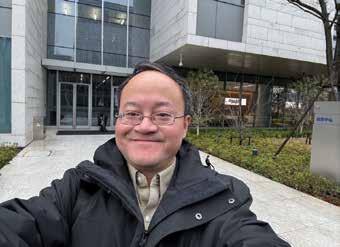
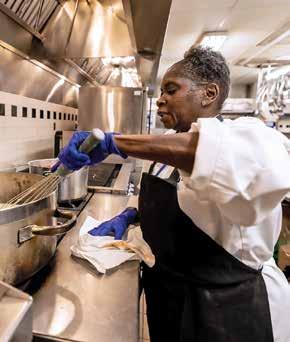
 Duke Kunshan University Professor of Electrical and Computer Engineering Xin Li poses for a selfie in front of his office in the Innovation Building on Duke’s campus in Kunshan, China. Photo courtesy of Xin Li.
Barbara Phelmetta stirs a pot of grits as she helps prepare breakfast in the George and George-Frank Wall Center for Student Life on East Campus.
Photo by Travis Stanley.
Duke Kunshan University Professor of Electrical and Computer Engineering Xin Li poses for a selfie in front of his office in the Innovation Building on Duke’s campus in Kunshan, China. Photo courtesy of Xin Li.
Barbara Phelmetta stirs a pot of grits as she helps prepare breakfast in the George and George-Frank Wall Center for Student Life on East Campus.
Photo by Travis Stanley.

Serving food is her love language. She’s just as happy to do it for the alums who come back to campus for her catfish or honeybun cake as she is for the 26 family members who ate Christmas dinner at her home.
“I like my job. I like what I do,” the Lead Production Worker says. “I love to cook, and I like the people.”
There’s a rhythm to everything she does while striding through the campus kitchen. Mix the butter into the grits at 6:28 a.m. Thicken the fruit compote at 6:37 a.m. Season the sausage gravy with a bit more pepper at 6:42 a.m. And at 6:51 a.m., line baking pans with bacon.
By 7:15 a.m., it’s all ready to be devoured.
7 a.m.
A Home Office in Virginia
Lit with morning sun, Vidya Raghavan sits in her home office with a mug filled with Trader Joe’s Five Country Espresso Blend.
At Duke since 2011, Raghavan, Associate Director for Vendor Management for Duke Clinical Research Institute (DCRI), has worked from Ashburn, Virginia, since 2015, when she relocated from Chapel Hill for her husband’s job.

Raghavan leads a four-person remote team negotiating vendor proposals for tasks such as drug distribution and lab analysis for DCRI trials. The work requires close communication with remote colleagues, Durham-based collaborators, and vendor contacts from around the globe. Last year, her team facilitated 526 vendor proposals and resubmissions.
“I get to do very exciting work,” Raghavan says. “The Duke brand is huge in our industry. I get to meet a lot of different people, and they always want to work with us.”
Raghavan is among the 547 Duke employees working in 20 approved states/districts outside of North Carolina. A recent CUPA-HR survey reported 89% of colleges and universities have out-of-state employees.
This morning, Raghavan examines notes for a 10 a.m. meeting about an upcoming study, wades through 92 emails and maps out her day. She compares her day to the video game Tetris.
“I try to figure out how to fit pieces in to make patterns and anticipate my workload,” Raghavan says. “This uninterrupted time is when I do that.”
11 a.m.
The Smallest Details Illuminated
The instrument before Lisa Cameron is as large as an oven with wires and tubes protruding from all angles that make it look like a Frankensteined creation. The Leica 2photon DIVE microscope is, in fact, worth about $1 million.
And Cameron loves helping researchers learn the best way to use it.
“My favorite thing is to work on a microscope with people,” she says.
Cameron, Associate Research Professor in the Department of Biology, directs the Light Microscopy Core Facility, which operates 24 hours a day, seven days a week. Researchers from 150 campus labs – primarily in Biology, Chemistry, Physics, Neuroscience, the Pratt School of Engineering and School of Medicine – visit the facility to access some of the country’s most advanced imaging instruments.
The Duke University School of Medicine is one of the largest biomedical research enterprises in the country with programs focused on the causes, prevention and treatment of human disease. In 2022-23 Duke University surpassed $1.39 billion in total research expenditures with more than $901 million in federally sponsored research spending.
The Leica, and the facility’s other hightech confocal and widefield fluorescence microscopes, allow researchers to view things that many typical microscopes can’t reveal.
“We provide microscopy expertise to help researchers perform and improve their microscopy image collection and analysis,” Cameron says. “And we help them answer their experimental question. It’s more than just the equipment.”
>>> continued on page 6

working.duke.edu 5
Lisa Cameron, Associate Research Professor in the Department of Biology, works with an instrument in the Light Microscopy Core Facility. Photo by Travis Stanley.
Vidya Raghavan of the Duke Clinical Research Institute begins her workday from her home office in Ashburn, Virginia. Photo courtesy of Vidya Raghavan.
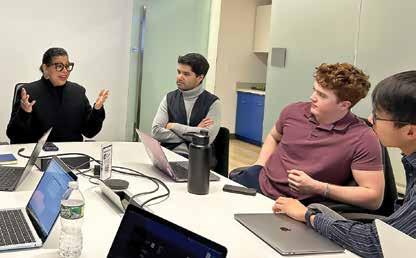
11:30 a.m. ‘Ambassador for the city’
Kishanna Harley is sitting alongside 10 students in Duke’s Washington, D.C., offices, listening to questions asked of a guest speaker from the Smithsonian Anacostia Community Museum.
The students, who are part of the Sanford School of Public Policy’s semester-long Duke in DC program, want to know how the city’s transportation, education and housing policies have shaped different neighborhoods.
A Washington, D.C., resident for most of her adult life, Harley, 44, enjoys hearing students dig into her city’s complicated history.
“This is about making the connection that the work they want to do, whether it’s public policy or political science, will shape people’s lives,” says Harley, Program Coordinator for Duke in DC.
Harley is a former teacher, librarian and museum consultant who joined Duke’s staff in 2023 to coordinate the Duke in DC program. She helps students connect to the city by doing everything from inviting guest speakers to ensuring students’ Metrorail cards are funded.
“It’s like all of my past work lives are converging into one role,” Harley says. “I’m an ambassador for the city I call home. I get to serve my community by helping these students understand D.C. better.”
12 p.m. Delivering Care in a Town of 3,064
Christianna Karr, a Nurse Practitioner at Duke Primary Care Louisburg, steps into one of the clinic’s eight exam rooms to type notes from the morning’s final visit.
Karr started as a Duke nurse in 2012 on Duke University Hospital’s seventh floor. Since 2019, she’s seen patients at Duke’s Louisburg clinic, which is tucked in a one-story brick building about 43 miles northeast of Durham. It’s one of the most remote clinics in the Duke Primary Care system.
“Out here, we have sweet, genuine people who are really thankful for care,” says Karr, who, a day earlier, received a Valentine’s Day cake from a patient.
In the 2022-23 fiscal year, Duke University Health System had nearly 5 million outpatient encounters at 426 clinics and care locations serving North Carolina communities.

By noon on this day in February, Karr had seen five patients in-person and four by virtual appointment, helping people with cold symptoms, diabetes and high blood pressure. Unlike other clinic staff members, Karr isn’t from Louisburg. But after nearly five years in the town of 3,064, Karr cherishes the community bond.
“In a small town,” she says, “everyone is connected.”
1:30 p.m. Recruiting New Talent
A steady flow of job seekers pass through a Smith Warehouse conference room for a career fair hosted by the Facilities Management Department.
Loretta Barrett, a Recruiter with Duke Human Resources, sits at a table with a pair of laptops, helping job hopefuls for landscape services, housekeeping and other roles set up profiles in Duke’s online hiring system.
Around 1:30 p.m., she eats the turkey sandwich and butternut squash soup that’s sat on her table since around noon.
“I think we’ve found some good people,” Barrett says.
In 27 years as a recruiter at Duke, Barrett has seen job postings go from papers tacked to bulletin boards to a fully online system. Most days, she monitors the flow of applicants for areas such as Athletics and reads applications, determining who moves to hiring managers.
Last year, Duke fielded applications from 89,744 people for 4,002 positions.
“There’s stability here,” Barrett says. “You have people that care about you, that will work with you and help you move forward. Duke is a large place, so you’ll have an opportunity to enhance your skills, change your career path and move toward your dream job.”

6 WORKING@DUKE
Duke in DC Program Coordinator Kishanna Harley speaks with students from the Sanford School of Public Policy. Photo courtesy of Kishanna Harley.
Duke Primary Care Nurse Practitioner Christianna Karr types notes from visits with patients at Duke’s Louisburg clinic. Photo by Travis Stanley.
Loretta Barrett, left, a Recruiter with Duke Human Resources, speaks with a job hopeful at a career fair for the Duke Facilities Management Department. Photo by Travis Stanley.
3 p.m.
Seeking Truth and Donuts
Andrew Janiak bursts into room 118 at the Friedl Building on East Campus carrying a duffel bag that holds the key to eight students’ happiness.
He’s brandishing a box of Monuts donuts because his Historical and Philosophical Perspectives on Science class argued that a lesson on science and philosophy in the early 18th century examining Leibniz and his use of the word “monads” was too similar to the delicious Ninth Street bakery’s name to go unrecognized.
Janiak forgot napkins.
“You’re just going to have to get donut grease on your Kuhn notes,” he says, chuckling.
Today the class is comparing high-level theories of Newton and Einstein as dissected by Thomas Kuhn when one student says, “I hate to make this move, but what do you mean by ‘truth?’”
At the head of the graduate seminar table, Janiak smiles. The professor of philosophy has been doing this for 21 years at Duke, as one of 4,109 faculty members teaching 16,539 undergraduate and graduate students. And it never gets old.
“Why do I do it? There are three reasons, basically: the students, the students and the students,” he says.
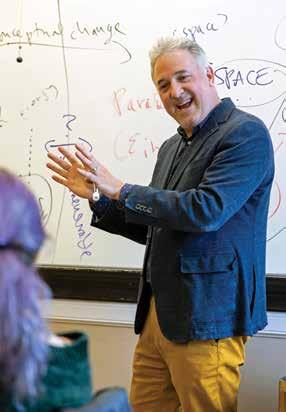
6 p.m. Seeing Every Student’s Potential
Lamar Walker knows part of being an effective event planner is quick thinking. So, when he discovers the Bryan Center space reserved for his Event Planning and Risk Management leadership training class is double-booked, he pivots.
“This is literally event planning on the fly,” Walker, the Associate Director in Student Involvement and Leadership, tells 17 students as he leads them down the hall to an empty room.
The room is stuffy and cramped, but it works. And when Walker launches into his presentation on risk management, he makes a formal topic engaging, sharing personal stories while he talks with his whole body – gesturing with his hands and scrunching his face for emphasis. He peppers his presentation with, “Does that make sense?” and explains, “I ask that question a lot. I don’t say it to be cute. I actually want to know.”
Duke has 605 registered student organizations, and Walker works to ensure groups are formally recognized and students running them feel supported.
“I have always been a person that sees potential,” Walker says. “And I think that the ability to work with student organizations really allows me to help others fulfill the potential that they see and the potential that I see in them.”
By Stephen Schramm and Jodie Valade
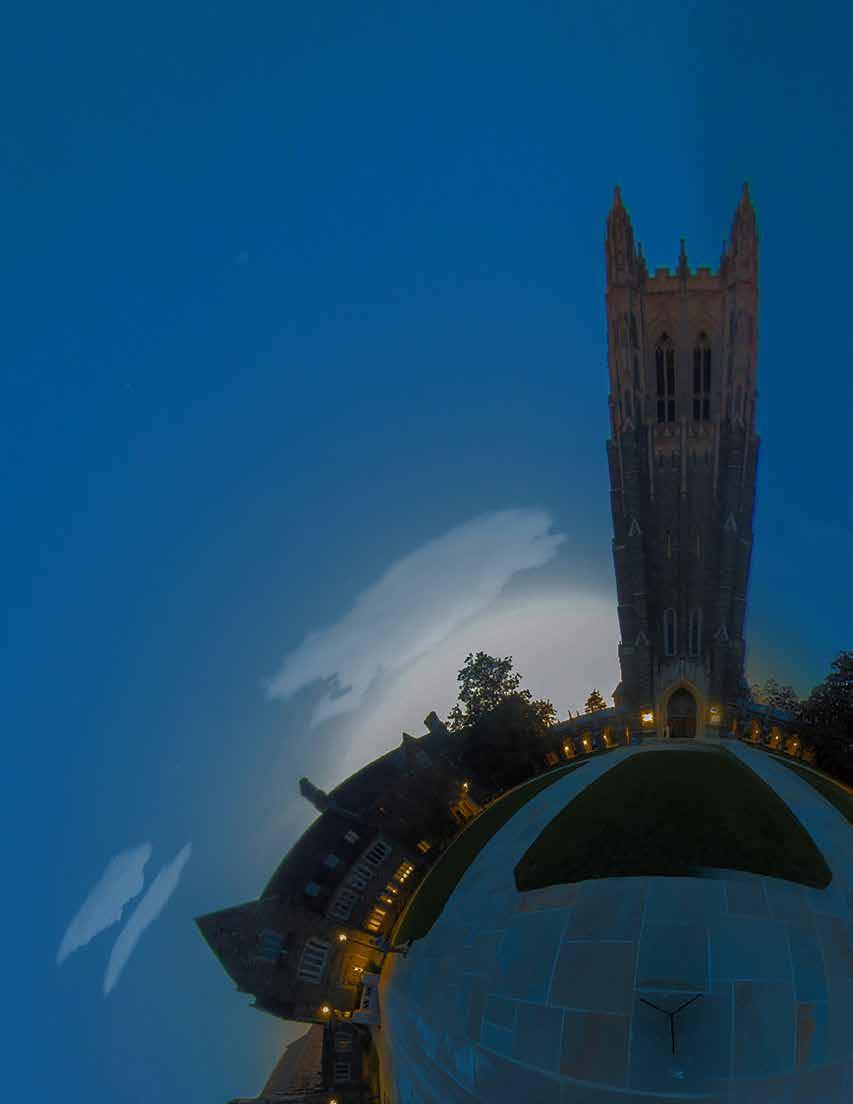

working.duke.edu 7
Lamar Walker, Associate Director in Student Involvement and Leadership, engages students with personal stories during an Event Planning and Risk Management training class. Photo by Travis Stanley.
Professor of Philosophy Andrew Janiak explains a concept to graduate students in a Historical and Philosophical Perspectives on Science seminar. Photo by Travis Stanley.

Career Lessons That Endure
Duke’s professional development programs provide experiences with lasting value
Christa Rutledge’s capstone project for the 2023 Front Line Supervisor Program explored the ways people learn. Studying educational approaches gave Rutledge, the Service Access Team Lead at Duke’s Outpatient Clinic and Duke Health North Durham, time to recall her supportive mentors and ponder the kind of mentor she hoped to become with the program’s help.


“Every manager I’ve had has taught me something,” Rutledge said. “If they hadn’t been willing to take me along on their coattails, I wouldn’t be where I am. So, why wouldn’t I want to do that for somebody else?”
A development program for entry level supervisors, the Front Line Supervisors Program offers lessons in leadership, business acumen and project management. Along with the Duke Leadership Academy, Duke Management Academy, and the Foundational Skills Program, it’s among the special programs offered for specific career tracks by Duke Learning & Organization Development.
Training and professional growth are among the top elements of a positive employee experience, according to MetLife’s 2023 U.S. Employee Benefit Trends Study.
“The value of having programs such as the academies at all levels shows a level of inclusion,” said Keisha Williams, Assistant Vice President for Learning & Organization Development. “We can provide employees actionable tools and resources that they can put back into their everyday practice. No matter the level you are at Duke, you can better understand your role and become a stronger team player and collaborator.”
Rutledge, who joined Duke in 2008, completed the Front Line Supervisors Program last year. She has incorporated key lessons such as effective delegation to members of her 11-person team to provide learning and growth opportunities.
“I’m trying to turn everything into a learning experience which can help you down the road,’” Rutledge said.
As other participants of Duke’s Learning & Organization Development programs grow their careers, many benefit from the enduring lessons from their programs. Here are a few stories.
Duke Leadership Academy: The Power of Collaboration
Vice President and Director of Athletics Nina King often encourages student athletes to connect with, and learn from, the wide variety of people on campus. Duke is, King will say, a “resource-rich environment.”
This perspective is rooted in King’s experience in the Duke Leadership Academy’s inaugural class in 2010. At the time, King had been at Duke for less than two years and had yet to build many connections around campus.
In the yearlong Duke Leadership Academy program, King collaborated with colleagues from areas such as Duke University Libraries and the Duke University School of Nursing to explore some of Duke’s real-world issues. She saw how gathering a range of voices often resulted in a deeper understanding of a situation and effective solutions.
8 WORKING@DUKE
Christa Rutledge of the Duke Outpatient Clinic and Duke Health North Durham was a member of the 2023 class for the Front Line Supervisors Program.
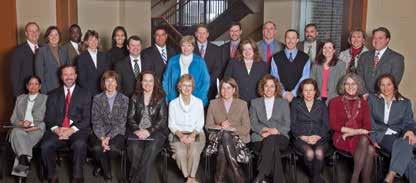
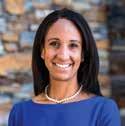
In the years since, King has often tapped into the brainpower around her while working in collaborative situations chairing the NCAA Division I Women’s Basketball Committee and serving in Duke University President Vincent E. Price’s cabinet.
“Given our individual professional experiences and our different backgrounds, we could still come together to solve a common problem,” King said of her Duke Leadership Academy colleagues. “While our stories may be different, a lot of the challenges we face are the same.”
Duke Management Academy: Valuing a Personal Touch
When Duke Health Business Transformation Office Director Thomas Davis chats with colleagues about his children’s soccer tournaments, or hears about colleagues’ hobbies, or birthday gifts for their kids, it’s an enjoyable byproduct of his Duke Management Academy experience.
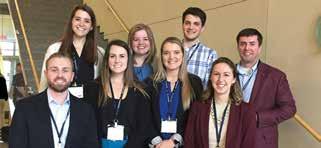

In 2019, while managing a Performance Services team, Davis was drawn to the Duke Management Academy, which is designed to support the growth of mid-level managers. The academy offers leadership training, networking opportunities and a 360-degree assessment of anonymous feedback from coworkers.
For Davis, the most useful piece of feedback was that his work-first communication style could come off as rigid.
In response, Davis worked to create a climate where team members could bring more of themselves to work. That meant sharing news about life in meetings and welcoming colleagues to do the same.
In addition to making for a more fun workplace, the more personal relationships with colleagues have created stronger teams built on open communication and an investment in one another’s success.
“You build trust, you build goodwill,” said Davis, who joined Duke in 2007. “You build an environment where everybody is assuming positive intent. If you have to have a difficult conversation, the reaction you get is a little bit better because you’ve built a real relationship.”
Foundational Skills Program: Fueling Career Ambitions
When Imer Ramadanovic began working as a food production assistant at Duke HomeCare and Hospice 15 years ago, he had more than 20 years of experience in restaurant kitchens. His hands were used to the motions of chopping vegetables and washing dishes.
But since 2020, Ramadanovic has reported each day to the same clinic to do a different kind of work. As a Health Unit Coordinator, Ramadanovic’s hands now dart across computer keyboards, summoning electronic health records and connecting the clinic’s fragile patients with resources they need.
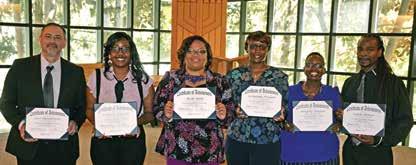

Ramadanovic credits his career change to the Foundational Skills Program, which he completed in 2019. The program is open to Duke University and Duke University Health System service area team members who aspire to move into administrative roles.
In addition to training in customer service, clerical and office skills, the program offers opportunities to learn while working alongside administrative professionals.
For Ramadanovic, who had no prior office experience, the computer skills he learned in the program helped him refocus his enthusiasm and dedication to chart a new career path.
“Everything they taught me I use every single day,” Ramadanovic said. “All of the essentials I needed, I learned in that program.”
By Stephen Schramm
working.duke.edu 9
for the 2025
open this fall. Learn more:
Applications
programs
duke.is/m/c5md
Thomas Davis, seen at a leadership summit at Virginia Tech, learned valuable skills in the Duke Management Academy. Photo courtesy of Thomas Davis.
Vice President and Director of Athletics Nina King was part of the inaugural Duke Leadership Academy in 2010.
Imer Ramadanovic of Duke HomeCare & Hospice reshaped his career path with the Foundational Skills Program.

In Crisis or Calm, Find the Counseling You Need Personal Assistance Service offers no-cost, short-term
In 2020, Emily Jackson faced a whirlwind of worry and fear. In the midst of the COVID pandemic, her mother, Mary, suffered a stroke and was left bedridden. Jackson, a Senior Regulatory Coordinator in the Department of Pediatrics’
Children’s Clinical Research Unit, felt overwhelmed by stress and anxiety while the world outside seemed to be spinning out of control. Looking for help, Jackson called Duke’s Personal Assistance Service (PAS) to speak with a counselor.
“I was in a really bad place at the time, and they helped me through it,” said Jackson, who benefitted from coping strategies offered by PAS. “Their help sustained me. I’m very grateful to them for that.”
PAS provides up to eight confidential, short-term counseling sessions per concern at no-cost for staff, faculty and eligible family members. In the 2022-23 fiscal year, PAS provided 6,122 total counseling sessions, mostly for mental/emotional concerns and family, relationship, or child issues. During that time, 74% of clients reported that they coped better after receiving help from PAS.
According to the American Psychological Association’s Stress in America 2023 report, 47% of adults said they wish they had someone to help them manage their stress.
PAS provides virtual consultations and in-person sessions at Duke Raleigh Hospital, Duke Regional Hospital, Duke Clinics and the PAS offices in Erwin Square.
Counselors can help in moments of crisis, and as PAS Director Nichole Capitanio pointed out, they can provide valuable guidance in calmer times, too. Capitanio said speaking with a PAS counselor is beneficial when life seems under control, but help is needed to change a behavior or to improve a relationship or work situation.
“That can be the perfect time to come in and work on whatever issues you may feel are there,” Capitanio said. “Because these issues aren’t causing a crisis, you may have more emotional bandwidth to address them and manage a change. I always try to tell people, it’s OK to come in when you think things are going OK.”
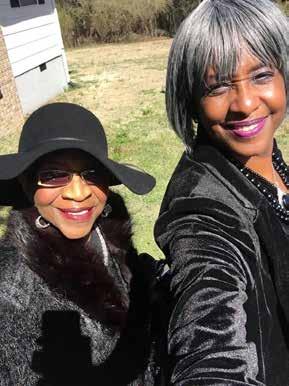

Jackson appreciates the versatility of the PAS benefit. In addition to using the service in 2020, and after her mother died at 86 in 2023, Jackson consulted with PAS at other, less overwhelming times during her 24 years at Duke.
“PAS has always helped me maintain balance and find a good frame of mind,” Jackson said. “This is a great benefit that Duke allows us to have. If you feel like you need it, you should take advantage of this resource. It doesn’t cost you anything. It’s confidential, it’s helpful and you will feel better.”
By Stephen Schramm

Make An Appointment North Carolina-based staff and faculty can schedule an in-person or virtual appointment by calling 919-416-1727. Employees who reside outside of North Carolina can access counseling by calling 800-327-2251. For more information, visit pas.duke.edu
counseling for mental health concerns
10 WORKING@DUKE
Nichole Capitanio
Emily Jackson, right, sought counsel from Duke’s Personal Assistance Service as the health of her mother, Mary, declined. Mary, left, died in 2023. Photo courtesy of Emily Jackson.
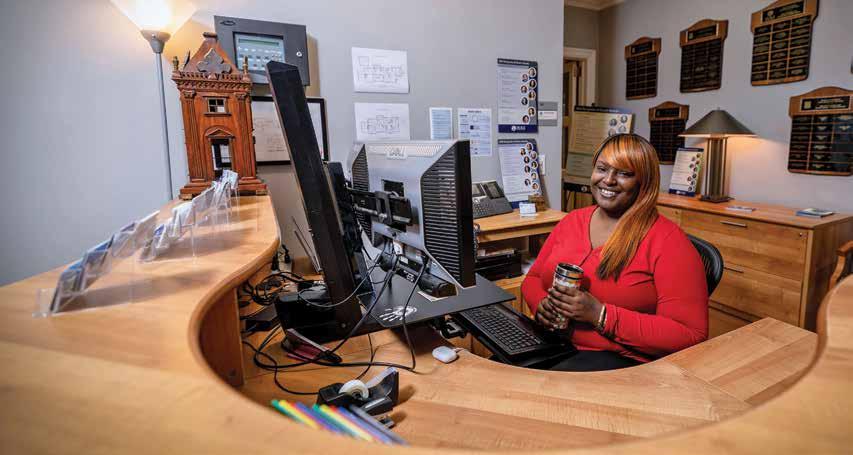
A Blend of On-Site and Remote Work Thrives
Fourth annual Working@Duke survey highlights preferences for work location flexibility
Diamond Riley doesn’t know why, but she swears there’s something about the coffee she drinks in the office that’s better than anything at home.
“I look forward to it,” she said. “I’m like, ‘I gotta go to work so I can get my coffee!’”
The Flavia Donut Shop coffee with the Sweet & Creamy creamer is just one draw for Riley, a Staff Assistant in the Duke Graduate School. The other is that she’s unabashedly a peopleperson and looks forward to every conversation with others.
At the front desk each day, Riley is the first friendly face anyone sees when they walk into the stone building that housed faculty in the 1930s and 1940s. It’s an enormous change from her previous job that offered little interaction.
Four years after COVID transformed how and where people work nationwide, Duke isn’t showing signs of moving away from work location flexibility for roles that don’t directly involve patients and students.
To assess work location desires of staff and faculty, Working@Duke conducted an online poll at the end of 2023 for the fourth consecutive year. Of nearly 3,500 employees who responded, 41% work remotely one to four days each week, while 27% – like Riley – are fully on-site. Among employees who responded, 32% work fully remotely, slightly lower than 2022.
Nationally, the College and University Professional Association for Human Resources found that in 2023, 24%
adopted a hybrid schedule, while 65.5% primarily worked on-site. Gallup reports that across the U.S., 52% of individuals in remote-capable roles maintain a hybrid schedule.
“It gives more options for people to get certain tasks done while at home,” said Antwan Lofton, Vice President for Duke Human Resources. “It has a lot of benefits.”
Franca Alphin, an Associate Professor in Family Medicine and Community Health and Dietitian at Duke Student Health, works a hybrid schedule that gives her coveted face-to-face time with colleagues she’s grown to rely on during her 35 years at Duke.
When she’s on campus, Alphin teaches and sees students clinically in Student Health. When she works from her Pittsboro home, she takes telemedicine calls – and can take a neighborhood walk with a friend or toss in a load of laundry.
Like Alphin, many employees (41%) in the Working@ Duke survey ranked no commute as the top benefit of remote work, while 25% listed flexibility to balance work and personal obligations as a top benefit.
A hybrid schedule lets Alphin log on her computer at 7 a.m. and skip a 45-minute commute each way.
“I can divide my day up very differently,” she said. “I just love having both options. I couldn’t imagine doing one extreme or the other anymore.”
By Jodie Valade
working.duke.edu 11
Diamond Riley is the first person anyone sees when they walk into the Duke Graduate School, and she says she craves the in-person interaction.
Photo by Travis Stanley.
How to Learn a New Language
Expand your horizons with foreign language resources at Duke University Libraries

As the Librarian for African and African American Studies at Duke University Libraries, Heather Martin recently guided a student through government documents and newspaper stories in French.
Without English translations available, Martin, who’s been on a self-guided journey learning French, translated the information herself.
“That was very satisfying,” Martin said. “I try to offer something extra when I help people with research. Understanding French was a nice thing to add.”
While learning a new language can seem daunting, staff, faculty and students can access free resources through Duke University Libraries to make the challenge approachable and fun.
English is the most widely spoken language in the United States, but the number of Americans who speak other languages is gradually rising. Recent U.S. Census Bureau estimates show that 21.7% of Americans now speak a language other than English at home with Spanish and Chinese dialects as the most common second languages.

Heidi Madden heads Duke University Libraries’ International and Area Studies department, a team of multilingual subject specialists who help patrons find materials in English and foreign languages. She recommends Transparent Language Online as a useful tool for learning a language.
Transparent Language Online is a self-paced interactive platform available to Duke community members when they access the service through the Duke University Libraries website and log in with their NetID.
“You can create your own account, and it will keep track of where you are,” Madden said. “It has videos, stories and grammar exercises embedded in the platform. It also sends you a new word every day, which is nice.”

Transparent Language Online covers more than 100 languages including Italian, Russian, Mandarin, Haitian Creole and Hindi. There are two versions of Spanish, three variations of French and four types of Arabic.
Martin, the Duke University Librarian for African and African American Studies, used Transparent Language Online to begin her education in French, a language she encounters researching topics related to Africa.
“It’s a great starting point,” Martin said. “And even if you’ve already got some experience in the language, there are tests you can go back and take to see where you are.”
Duke University Libraries also has foreign language lessons on CDs for nearly 20 languages, including Spanish, French, Italian, Japanese, Arabic and Vietnamese.
Another way to embrace a foreign language is to experience the culture associated with it. To do that, Duke University Libraries offers Kanopy, Asian Film Online and Latin America in Film for streaming hundreds of foreign language films and documentaries.
“Being multilingual is one of the biggest joys of my life,” said Madden, who speaks German and French. “To look at the world and be able to read things from different places, and understand both sides, and not be dependent on one point of view is very enriching.”
By Stephen Schramm
Visit duke.is/r/k4rd for foreign language resources. 12 WORKING@DUKE
Heather Martin, Duke’s Librarian for African and African American Studies, got help learning French with Duke University Libraries resources. Photo by Stephen Schramm.
Heidi Madden of Duke University Libraries’ International and Area Studies Department helps patrons find materials in English and other languages. Photo by Stephen Schramm

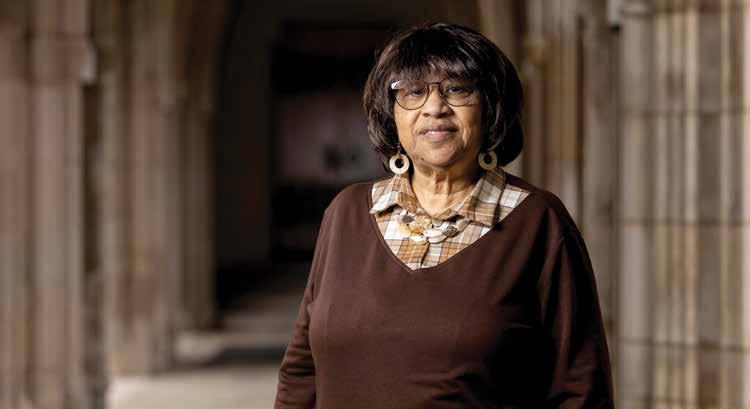
A Steady ‘Heartbeat’ of Duke Human Resources
After 51 Years at Duke, Celenzy Chavis is not ready to retire yet
When Celenzy Chavis landed her very first job at Duke fresh out of North Carolina Central University, she thought that she’d work for a year as a secretary and then move on to something bigger and better.
“I guess it just happened,” Chavis said. “I can’t really tell you what happened other than the working environment was good, and I think perhaps I saw that there could be promotional opportunities. So, I just stayed.”
And at age 72, as Duke celebrates its Centennial this year with Chavis employed for more than half those 100 years, she has memories and friendships to last a lifetime. And she knows this for certain: She’s not ready to leave just yet.
Since 1972, Chavis has been a fixture among the Duke staff – first as a secretary and then in research roles for the Center for the Study of Aging – before transitioning to more than four decades in Duke Human Resources in a variety of positions. She currently is a Senior Staff and Labor Relations Consultant.
“Celenzy is definitely the heartbeat of Labor and Relations,” said Antwan Lofton, Vice President for Duke Human Resources.
Chavis has watched Duke grow both physically and in reputation. She was at Duke in 1980 when Duke North Hospital opened and was instrumental in hiring staff for the new 616-bed hospital as a member of the Recruitment team in Human Resources.
“I remember the long hours working – leaving, going to get a lunch or dinner break, coming back, working there late at

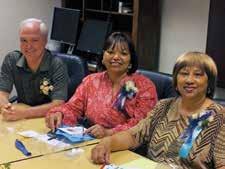
night – because they had a deadline to get the hospital staffed,” she said.
And in 2020 amid the coronavirus pandemic, Chavis experienced the greatest changes of her career as many staff were forced into remote work environments.
“We could see some of the challenges because it was affecting the way people came to work and their performance,” she said.
Her fondest memories came at Family Days, a carnivallike experience that Duke Human Resources sponsored for the workforce in the 1980s and early 1990s when she mingled with co-workers’ families.
And if she has any advice learned over five decades at Duke, it’s this: “Understand your role and the purpose for the work that you do. Be flexible, open to change and foster teamwork.”
Denise Evans, a former Assistant Vice President for Staff and Labor Relations at Duke who retired in 2017, met Chavis in 1987. Evans considers Chavis among her dearest friends. Their tenure at Duke was five years apart.
“We had always said we were going to retire together,” Evans said. “And when I got to 40 years, and she was at 45, I was like, ‘Celenzy, I’m ready.’ And she said, ‘OK.’”
But Chavis wasn’t ready then. And she’s still not.
“I have a project that I’m working on, that’s a personal project,” Chavis said. “And, so, that’s what keeps me.”
Four grandchildren and lifelong friends are waiting in retirement whenever Chavis is ready.
By Jodie Valade
Discover more Centennial stories about Duke’s workforce: duke.is/DukeCentennial
working.duke.edu 13
Top: Celenzy Chavis has been a mainstay in Duke’s Human Resources for more than 50 years. Photo by Travis Stanley. Bottom: Pictured at a length-of-service appreciation event in 2012 are Richard Lee (30 years); Denise Evans (35 years); and Celenzy Chavis (40 years). Photo courtesy of Denise Evans.
Toward Racial Justice

Beyond the Chapel Walls
With its ‘Unity through Diversity’ theme, the Chapel connects through intentional outreach
The Duke University Chapel is a visual representation of Duke, a “great towering church” that James B. Duke requested and has become a widely recognized symbol of the university.
That’s part of why the Chapel is committed to ensuring that diversity and inclusion are pillars upon which the foundation of the community rests.
“There’s been a pulse, there’s been a heart – a human heart – at the heart of the university, and that’s the Chapel,” said Rev. Dr. Luke A. Powery, Dean of Duke Chapel. “Our approach is multifaceted, but I think ultimately, it’s to say: Diversity is a reflection of who God is. It’s a reflection of the beauty of God. And we want to live into that in a greater way – in all of the areas that we are engaged in.”
“Unity through diversity” is a central theme of the Chapel’s educational and outreach programs and a vital part of all the ways that it interacts with Duke’s campus and beyond. Here are some ways the Chapel community fosters connections.
Guided conversations

Guest artists joining the Chapel Choir for “Our First Lady of Jazz” will include the Vocal Jazz Ensemble from North Carolina Central University and Patrice E. Turner, a student in the Divinity School hybrid program and Director of Music and Worship Arts at Ebenezer Baptist Church in Atlanta.
Theology Underground, a monthly series for students, faculty and staff, offers “conversations that really explore the intersections of race, faith and place,” said Rev. Racquel C.N. Gill, Minister for Intercultural Engagement. Recent discussions have included The Holy in Hip-Hop with Dr. Mark Anthony Neal, chair of the Department of African and African American Studies, and Theology and Mental Health with Dr. AY Bryant, a psychologist with Duke Counseling and Psychological Services.
Nurturing expression through music
The Chapel offers diverse musical selections, which include a Centennial concert in April, “Our First Lady of Jazz: Celebrating Mary Lou Williams.”
Williams, who arranged for Duke Eillington and performed with Dizzy Gillespie and others, was a composer and jazz pianist who taught at Duke and occasionally performed in the Chapel and with the Chapel Choir.
“Two of the hallmarks of life at the Chapel that people always think of is the great preaching tradition, and they think of sacred music,” said Zebulon Highben, Director of Chapel Music. “It’s critical that we are intentional and more thoughtful about inclusion and equity and equality for all people who consider this place home.”
Living in community across divides
The Bridge Internship Program, a partnership with North Carolina Central University, brings together students from NCCU and Duke across religious traditions in an eight-week summer residency. Students live together and consider how matters of faith affect them.
“If you don’t have the diversity piece, God’s love isn’t revealed as all-inclusive,” said Rev. Bruce Puckett, Assistant Dean of Duke University Chapel. “It’s so essential to what I understand a good world to be and the Chapel’s role in creating that.”
By Jodie Valade
Is there work in your area that advances racial equity?
Tell us about it: hr.duke.edu/sendnews
14 WORKING@DUKE
Guest artist Anton Armstrong, Professor of Music at St. Olaf College, leads a choral clinic on sacred music at Duke Chapel in January 2024. Photo courtesy of Duke Chapel.
Save While Investing in Your Whole-Person Health
Duke Health & Well-Being offers discounts on fitness memberships, acupuncture and more
Since becoming a Duke Health & Fitness Center member last summer, Ramona Rodriguiz has started most weekdays with workouts around daybreak.
At first, Rodriguiz, 60, saw her morning sessions on weight machines and treadmills as a way to feel healthy and strengthen a right arm weakened by what she thought was a shoulder injury.
Since February, when Duke neurologists diagnosed the weakness in her arm as a symptom of Parkinson’s disease, the morning workouts are an essential well-being strategy for Rodriguiz, a Senior Research Associate in Duke’s Division of Behavioral Medicine & Neurosciences.
“Our goal is to hold the symptoms where they are or even push them a little bit into remission,” said Rodriguiz, who crafted a custom Parkinson’s-focused training plan with Health & Fitness Center Exercise Physiologist Cheyanne Oakley.
Nestled among the pines on the Duke Center for Living Campus off Erwin Road, the Health & Fitness Center is part of Duke Health & Well-Being, a collection of facilities designed to enrich the full spectrum of health. Among them is Duke Integrative Medicine, which combines Duke physicians and innovative healing practices in a tranquil setting.
Staff and faculty can experience many of Duke Health & Well-Being’s services at a discount through the Duke employee discount program. Among the discounts available are 15% off yoga and massage therapy and acupuncture

sessions at Duke Integrative Medicine. These services are not covered by Duke’s employee medical plans.
“We’re convenient, and we offer a lot,” said Teresa Keever, Associate Vice President for Duke Health & WellBeing. “We have beautiful facilities and an awesome staff that truly cares about you and helping you with your goals, whatever they may be.”
Bridget Fletcher, Pratt School of Engineering Managing Director for Graduate Student Programs & Services, finds mental balance and relief from headaches with monthly acupuncture sessions.
“It’s a very calming experience,” Fletcher said. “You’re in a quiet, spa-like space for 20 or 30 minutes on your own, letting the needles do their work and allowing you relax.”
Staff and faculty also receive 15% off memberships to the Health & Fitness Center, a 30,000-square foot fitness facility offering a spacious workout space, saltwater pool, indoor and outdoor tracks, and group workout classes.
Rodriguiz, who uses the discount for her membership, said the Parkinson’s disease diagnosis has given her an extra sense of purpose to morning workouts. The center’s warm and welcoming staff, its peaceful setting, and the energy boost from each morning visit keep her coming back.
“I’m so lucky to be here at Duke, not just because I have access to doctors who helped diagnose this, but also because we have this magnificent facility,” Rodriguiz said.
By Stephen Schramm





working.duke.edu 15
Visit hr.duke.edu/discounts for a full list of savings available from Duke Health & Well-Being as well as other area businesses and vendors. Your NetID may be needed to access deals
Ramona Rodriguiz, left, works out with the help of Duke Health & Fitness Center’s Cheyanne Oakley. Photo by Stephen Schramm.
What you’re sharing online


dukepresidentprice Follow
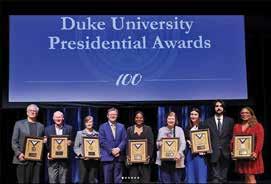
dukepresidentprice The Presidential Award is one of Duke’s highest honors for faculty and staff, recognizing individuals and teams who demonstrate an extraordinary commitment to Duke’s shared values. Today we celebrated this year’s recipients with a wonderful ceremony at Page Auditorium.

Duke Psychiatry & Behavioral Sciences
@DukePsychiatry
Duke Psychiatry’s Dr. Marianne Chanti-Ketterl recently shared her prediction for Duke in the next 100 years as part of a #Duke100 feature. Her hope? More transparency & a sense of belonging for all. More from Dr. Chanti-Ketterl & others: ow.ly/n9Z050QQfn4 @WorkingatDuke
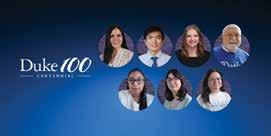
Mar 11, 2024
March 7, 2024
Go online to discover more
News You
Can Use:
Project to Intermittently Close Science Drive
Pipe replacement will result in traffic, parking and busing adjustments through the end of August.

Free Live Webinars
Monthly health and mental well-being webinars begin at noon and last for 30 minutes.

Do you have news to share?
Is there something you’d like for us to cover? Please tell us





Share story ideas by emailing working@duke.edu
with Working@Duke on Social Media Duke University Office of Communication Services 705 Broad St., Durham, N.C. 27708 DUKE
Connect
SOCIAL
Instagram instagram.com/workingatduke Facebook facebook.com/WorkingatDuke twitter.com/WorkingatDuke















 Duke Kunshan University Professor of Electrical and Computer Engineering Xin Li poses for a selfie in front of his office in the Innovation Building on Duke’s campus in Kunshan, China. Photo courtesy of Xin Li.
Barbara Phelmetta stirs a pot of grits as she helps prepare breakfast in the George and George-Frank Wall Center for Student Life on East Campus.
Photo by Travis Stanley.
Duke Kunshan University Professor of Electrical and Computer Engineering Xin Li poses for a selfie in front of his office in the Innovation Building on Duke’s campus in Kunshan, China. Photo courtesy of Xin Li.
Barbara Phelmetta stirs a pot of grits as she helps prepare breakfast in the George and George-Frank Wall Center for Student Life on East Campus.
Photo by Travis Stanley.













































